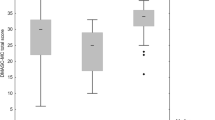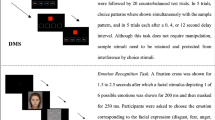Abstract
In substance use and psychotic disorders, socially problematic behaviours, such as high aggression may, in part, be explained by deficits in social cognition skills, like the detection of emotions or intentions in others. The aim of this study was to assess the magnitude of social cognition impairment and its association with aggression in individuals with methamphetamine (MA) dependence, methamphetamine-associated psychosis (MAP), and healthy controls (CTRL). A total of 20 MAP participants, 21 MA-dependent participants without psychosis, and 21 CTRL participants performed a facial morphing emotion recognition task (ERT) across four basic emotions (anger, fear, happiness and sadness) and the reading the mind in the eyes task (RMET), and completed the aggression questionnaire. Both MA-dependent groups showed impairment in social cognition in terms of lower RMET scores relative to CTRL participants (MA; p = .047; MAP: p < .001). Additionally, performance decrements were significantly greater in MAP (p = .040), compared to MA-dependent participants. While deficits in recognising emotional expressions were restricted to anger in the MA group (p = .020), a generalized impairment across all four emotions was observed in MAP (all p ≤ .001). Additionally, both patient groups demonstrated higher levels of aggression than CTRLs, yet no association was found with social cognition. This study supported the notion of deficits in recognising facial emotional expressions and inferring mental states of others in MA dependence, with additional impairments in MAP. Failure to detect an association between social cognitive impairment and aggressive behaviour may implicate independent disturbances of the two phenomena in MA dependence.


Similar content being viewed by others
References
Ambadar Z, Schooler JW, Cohn JF (2005) Deciphering the enigmatic face: the importance of facial dynamics in interpreting subtle facial expressions. Psychol Sci 16(5):403–410. https://doi.org/10.1111/j.0956-7976.2005.01548.x
Aoki Y, Orikabe L, Takayanagi Y, Yahata N, Mozue Y, Sudo Y, Ishii T, Itokawa M (2013) Volume reductions in frontopolar and left perisylvian cortices in methamphetamine induced psychosis. Schizophr Res 147(2):355–361. https://doi.org/10.1016/j.schres.2013.04.029
Baron-Cohen S, Bowen DC, Holt RJ, Allison C, Auyeung B, Lombardo MV, Smith P, Lai MC (2015) The “reading the mind in the eyes” test: complete absence of typical sex difference in ~400 men and women with autism. PLoS One 10(8):e0136521. https://doi.org/10.1371/journal.pone.0136521
Baron-Cohen S, Wheelwright S, Hill J, Raste Y, Plumb I (2001) The ‘reading the mind in the eyes’ test revised version: a study with normal adults, and adults with Asperger syndrome or high-functioning autism. J Child Psychol Psychiatry 42:241–251. https://doi.org/10.1111/1469-7610.00715
Beck AT, Steer RA, Brown GK (1996) Manual for the Beck depression inventory-II. Psychological Corporation, San Antonio
Blair RJR, Morris JS, Frith CD, Perrett DI, Dolan RJ (1999) Dissociable neural responses to facial expressions of sadness and anger. Brain 122:883–893. https://doi.org/10.1093/brain/122.5.883
Bora E, Yücel M, Pantelis C (2009) Theory of mind impairment: a distinct trait-marker for schizophrenia spectrum disorders and bipolar disorder? Acta Psychiatr Scand 120:253–264. https://doi.org/10.1111/j.1600-0447.2009.01414.x
Bradley B, DeFife JA, Guarnaccia C, Phifer J, Fani N, Ressler KJ, Westen D (2011) Emotion dysregulation and negative affect: association with psychiatric symptoms. J Clin Psychiatry 72:685–691. https://doi.org/10.4088/JCP.10m06409blu
Brüne M (2005) Theory of mind in schizophrenia: a review of the literature. Schizophr Bull 31:21–42. https://doi.org/10.1093/schbul/sbi002
Buss AH, Perry M (1992) The aggression questionnaire. J Pers Soc Psychol 63:452–459. https://doi.org/10.1037/0022-3514.63.3.452
Calder AJ, Keane J, Lawrence AD, Manes F (2004) Impaired recognition of anger following damage to the ventral striatum. Brain 127:1958–1969. https://doi.org/10.1093/brain/awh214
Clemens KJ, Van Nieuwenhuyzen PS, Li KM, Cornish JL, Hunt GE, McGregor IS (2004) MDMA (“ecstasy”), methamphetamine and their combination: long-term changes in social interaction and neurochemistry in the rat. Psychopharmacology 173(3–4):318–325. https://doi.org/10.1007/s00213-004-1786-x
Ekman P, Friesen WV (1976) Pictures of facial affect. Consulting Psychologists Press, Palo Alto
Fett AKJ, Viechtbauer W, Dominguez MG, Penn DL, van Os J, Krabbendam L (2011) The relationship between neurocognition and social cognition with functional outcomes in schizophrenia: a meta-analysis. Neurosci Biobehav Rev 35(3):573–588. https://doi.org/10.1016/j.neubiorev.2010.07.001
First MB, Spitzer RL, Gibbon M, Williams JBW (2002) Structured clinical interview for DSM-IV-TR axis I disorders, research version, patient edition (SCID-I/P). Biometrics Research, New York State Psychiatric Institute, New York
Gregory C, Lough S, Stone V, Erzinclioglu S, Martin L, Baron-Cohen S, Hodges JR (2002) Theory of mind in patients with frontal variant frontotemporal dementia and Alzheimer's disease: theoretical and practical implications. Brain 125(4):752–764. https://doi.org/10.1093/brain/awf079
Hargreaves A, Mothersill O, Anderson M, Lawless S, Corvin A, Donohoe G (2016) Detecting facial emotion recognition deficits in schizophrenia using dynamic stimuli of varying intensities. Neurosci Lett 633:47–54. https://doi.org/10.1016/j.neulet.2016.09.017
Harmer CJ, Thilo KV, Rothwell JC, Goodwin GM (2001) Transcranial magnetic stimulation of medial-frontal cortex impairs the processing of angry facial expressions. Nat Neurosci 4:17–18. https://doi.org/10.1038/82854
Harmer CJ, Grayson L, Goodwin GM (2002) Enhanced recognition of disgust in bipolar illness. Biol Psychiatry 51(4):298–304. https://doi.org/10.1016/S0006-3223(01)01249-5
Henry JD, Mazur M, Rendell PG (2009) Social-cognitive difficulties in former users of methamphetamine. Br J Clin Psychol 48:323–327. https://doi.org/10.1111/j.2044-8260.2009.tb00487.x
Hirao K, Miyata J, Fujiwara H, Yamada M, Namiki C, Shimizu M, Sawamoto N, Fukuyama H, Hayashi T, Murai T (2008) Theory of mind and frontal lobe pathology in schizophrenia: a voxel-based morphometry study. Schizophr Res 105(1–3):165–174. https://doi.org/10.1016/j.schres.2008.07.021
Homer BD, Halkitis PN, Moeller RW, Solomon TM (2013) Methamphetamine use and HIV in relation to social cognition. J Health Psychol 18(7):900–910. https://doi.org/10.1177/1359105312457802
Homer BD, Solomon TM, Moeller RW, Mascia A, DeRaleau L, Halkitis PN (2008) Methamphetamine abuse and impairment of social functioning: a review of the underlying neurophysiological causes and behavioral implications. Psychol Bull 134:301–310. https://doi.org/10.1037/0033-2909.134.2.301
Kay SR, Fiszbein A, Opler LA (1987) The positive and negative syndrome scale (PANSS) for schizophrenia. Schizophr Bull 13:261–276. https://doi.org/10.1093/schbul/13.2.261
Kessels RPC, Gerritsen L, Montagne B, Ackl N, Diehl J, Danek A (2007) Recognition of facial expressions of different emotional intensities in patients with frontotemporal lobar degeneration. Behav Neurol 18:31–36. https://doi.org/10.1155/2007/868431
Kim YT, Kwon DH, Chang Y (2011) Impairments of facial emotion recognition and theory of mind in methamphetamine abusers. Psychiatry Res 186:80–84. https://doi.org/10.1016/j.psychres.2010.06.027
Kim YT, Song HJ, Seo JH, Lee JJ, Lee J, Kwon DH, Yoo DS, Lee HJ, Suh KJ, Chang Y (2010) Alterations in cortical activity of male methamphetamine abusers performing an empathy task: fMRI study. Hum Psychopharmacol Clin Exp 25:63–70. https://doi.org/10.1002/hup.1083
Lapworth K, Dawe S, Davis P, Kavanagh D, Young R, Saunders J (2009) Impulsivity and positive psychotic symptoms influence hostility in methamphetamine users. Addict Behav 34(4):380–385. https://doi.org/10.1016/j.addbeh.2008.11.014
Lawrence AD, Calder AJ, McGowan SW, Grasby PM (2002) Selective disruption of the recognition of facial expressions of anger. Neuroreport 13(6):881–884. https://doi.org/10.1097/00001756-200205070-00029
Lederer K, Fouche JP, WilsonD SDJ, Uhlmann A (2015) Frontal white matter changes and aggression in methamphetamine dependence. Metab Brain Dis 31(1):53–62. https://doi.org/10.1007/s11011-015-9775-9
London ED, Simon SL, Berman SM, Mandelkern MA, Lichtman AM, Bramen J, Shinn AK, Miotto K, Learn J, Dong Y, Matochik JA, Kurian V, Newton T, Woods R, Rawson R, Ling W (2004) Regional cerebral dysfunction associated with mood disturbances in abstinent methamphetamine abusers. Arch Gen Psychiatry 61:73–84. https://doi.org/10.1001/archpsyc.61.1.73
Lundqvist D, Flykt A, Öhman A (1998) The Karolinska directed emotional faces - KDEF (CD ROM). Karolinska Institute, Department of Clinical Neuroscience, Psychology Section, Stockholm
Martino DJ, Strejilevich SA, Fassi G, Marengo E, Igoa A (2011) Theory of mind and facial emotion recognition in euthymic bipolar I and bipolar II disorders. Psychiatry Res 189:379–384. https://doi.org/10.1016/j.psychres.2011.04.033
Montagne B, de Geus F, Kessels RPC, Denys D, de Haan EHF, Westenberg HGM (2008) Perception of facial expressions in obsessive-compulsive disorder: a dimensional approach. Eur Psychiatry 23(1):26–28. https://doi.org/10.1016/j.eurpsy.2007.07.007
Montagne B, Kessels RPC, De Haan EHF, Perrett DI (2007) The emotion recognition task: a paradigm to measure the perception of facial emotional expressions at different intensities. Percept Mot Skills 104:589–598. https://doi.org/10.2466/pms.104.2.589-598
Montagne B, Kessels RPC, Frigerio E, de Haan EHF, Perrett DI (2005) Sex differences in the perception of affective facial expressions: do men really lack emotional sensitivity? Cogn Process 6:136. https://doi.org/10.1007/s10339-005-0050-6
Montagne B, Schutters S, Westenberg HGM, van Honk J, Kessels RPC, de Haan EHF (2006) Reduced sensitivity in the recognition of anger and disgust in social anxiety disorder. Cogn Neuropsychiatry 11(4):389–401. https://doi.org/10.1080/13546800444000254
Orikabe L, Yamasue H, Inoue H, Takayanagi Y, Mozue Y, Sudo Y, Ishii T, Itokawa M, Suzuki M, Kurachi M, Okazaki Y, Kasai K (2011) Reduced amygdala and hippocampal volumes in patients with methamphetamine psychosis. Schizophr Res 132:183–189. https://doi.org/10.1016/j.schres.2011.07.006
Payer DE, Liebermann MD, London ED (2011) Neural correlates of affect processing and aggression in methamphetamine dependence. Arch Gen Psychiatry 68(3):271–282. https://doi.org/10.1001/archgenpsychiatry.2010.154
Payer DE, Nurmi EL, Wilson SA, McCracken JT, London ED (2012) Effects of methamphetamine abuse and serotonin transporter gene variants on aggression and emotion-processing neurocircuitry. Transl Psychiatry 2:e80. https://doi.org/10.1038/tp.2011.73
Plüddemann A, Flisher AJ, Mathews C, Parry CDH, Lombard CA (2010) Methamphetamine use, aggressive behaviour and other mental health issues among high-school students in Cape Town, South Africa. Drug Alcohol Depend 109(1-3):14–19. https://doi.org/10.1016/j.drugalcdep.2009.11.021
Premack D, Woodruff G (1978) Does the chimpanzee have a theory of mind? Behav Brain Sci 4:515–526
Rowland JE, Hamilton MK, Vella N, Lino BJ, Mitchell PB, Green MJ (2013) Adaptive associations between social cognition and emotion regulation are absent in schizophrenia and bipolar disorder. Front Psychol 3:3–10
Scholten MR, Aleman A, Montagne B, Kahn RS (2005) Schizophrenia and processing of facial emotions: sex matters. Schizophr Res 78:61–67. https://doi.org/10.1016/j.schres.2005.06.019
Sekine Y, Ouchi Y, Takei N, Yoshikawa E, Nakamura K, Futatsubashi M, Okada H, Minabe Y, Suzuki K, Iwata Y, Tsuchiya KJ, Tsukada H, Iyo M, Mori N (2006) Brain serotonin transporter density and aggression in abstinent methamphetamine abusers. Arch Gen Psychiatry 63:90–100. https://doi.org/10.1001/archpsyc.63.1.90
Semple SJ, Patterson TL, Rant I (2005) Methamphetamine use and depressive symptoms among heterosexual men and women. J Subst Use 10(1):31–47. https://doi.org/10.1080/1465989042000271264
Sommers I, Baskin D (2006) Methamphetamine use and violence. J Drug Issues 36(1):77–96. https://doi.org/10.1177/002204260603600104
Uhlmann A, Fouche JP, Koen N, Meintjes EM, Wilson D, Stein DJ (2016) Fronto-temporal alterations and affect regulation in methamphetamine dependence with and without a history of psychosis. Psychiatry Res Neuroimaging 248:30–38. https://doi.org/10.1016/j.pscychresns.2016.01.010
Völlm BA, de Araujo IE, Cowen PJ, Rolls ET, Kringelbach ML, Smith KA, Jezzard P, Heal RJ, Matthews PM (2004) Methamphetamine activates reward circuitry in drug naïve human subjects. Neuropsychopharmacology 29(9):1715–1722. https://doi.org/10.1038/sj.npp.1300481
Watt MH, Meade CS, Kimani S, MacFarlane JC, Choi KW, Skinner D, Pieterse D, Kalichman SC, Sikkema KJ (2014) The impact of methamphetamine (“tik”) on a peri-urban community in Cape Town, South Africa. Int J Drug Policy 25(2):219–225. https://doi.org/10.1016/j.drugpo.2013.10.007
Zhong N, Jiang H, Du J, Zhao Y, Sun H, Xu D, Li C, Zhuang W, Li X, Hashimoto K, Zhao M (2016) The cognitive impairments and psychological wellbeing of methamphetamine dependent patients compared with health controls. Prog Neuro-Psychopharmacol Biol Psychiatry 69:31–37. https://doi.org/10.1016/j.pnpbp.2016.04.005
Zweben JE, Cohen JB, Christian D, Galloway GP, Salinardi M, Parent D, Iguchi M (2004) Psychiatric symptoms in methamphetamine users. Am J Addict 13(2):181–190. https://doi.org/10.1080/10550490490436055
Acknowledgements
This work has been funded by grants from the Medical Research Council of South Africa (MRC).
Author information
Authors and Affiliations
Corresponding author
Ethics declarations
Conflict of interest
Dr. Stein has received research grants and/or consultancy honoraria from Abbott, ABMRF, Astrazeneca, Biocodex, Eli-Lilly, GlaxoSmithKline, Jazz Pharmaceuticals, Johnson & Johnson, Lundbeck, National Responsible Gambling Foundation, Novartis, Orion, Pfizer, Pharmacia, Roche, Servier, Solvay, Sumitomo, Sun, Takeda, Tikvah, and Wyeth. All other authors declare that they have no conflict of interest.
Rights and permissions
About this article
Cite this article
Uhlmann, A., Ipser, J.C., Wilson, D. et al. Social cognition and aggression in methamphetamine dependence with and without a history of psychosis. Metab Brain Dis 33, 559–568 (2018). https://doi.org/10.1007/s11011-017-0157-3
Received:
Accepted:
Published:
Issue Date:
DOI: https://doi.org/10.1007/s11011-017-0157-3




